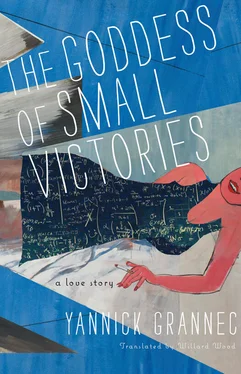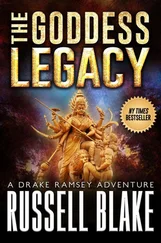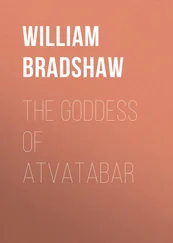As always, Leo had an opinion on the subject.
“Gödel is an icon at MIT. We use his portrait as a target when we play darts. We even organized a ‘Gödel versus Turing’ festival.”
“Who won?”
“Scoreless game. An undecidable proposition, Professor Sicozzi.”
“If such a battle ever took place, Gödel won it a long time ago.”
“Turing’s consolation prize was being the father of modern computer science. Gödel pushed formal logic to its extremes. The Englishman gave logic reality by developing a technology for it.”
The Frenchman attacked his plate vigorously. Leo watched him briefly before continuing.
“Another tragic mathematical fate. Brilliance and decline. One of them died mad, while the other made a theatrical exit. He killed himself by biting an apple laced with arsenic. Poisoned like Snow White.”
Anna decided not to correct him, although she knew the story of the English logician perfectly well. He had not committed suicide over mathematics: he had been persecuted by the British government for his homosexuality and forced to take a barbaric hormonal treatment. Yet it was thanks to him that Enigma, the German ciphering machine, had been cracked. Without Turing, the Allies would not have won the intelligence battle during World War II.
Leonard would allow no one to contradict him in his own field of expertise. Unsurprisingly, he went on to tell the story of the Turing machine, the precursor of the modern computer. At the end of the 1930s, the British mathematician had devised a theoretical system for executing simple algorithms. He had gone from there to the idea of a metamachine that could combine all these operations infinitely. Anna had helped mount an exhibition on von Neumann and ENIAC, another great leap forward in the history of computers. She could therefore have told Leo a thing or two on the subject, but the chance to hear Leo wax enthusiastic was so rare that she swallowed her pride. She was within an ace of exclaiming, “You’re so strong!” He wouldn’t have appreciated the joke, and he didn’t need anyone to tell him what he already knew. As to trying out Adele’s theorem on a Fields medalist, she would never have dared.
“Pushing his concept to the limit, Turing realized that his machine could only supply an answer that already existed. It wasn’t capable of deciding whether certain questions were decidable. Which is to say, deciding within a finite time whether a proposition was true or false.”
“The incompleteness theorem is unavoidable, even to a machine.”
“You, Anna Roth, are interested in mathematics?”
“I’m not sure I understood the whole thing, but Adele did speak to me about the fact that they met.”
Ernestine gave her a quiet smile before going back to banging cabinet doors; she, too, knew the technique.
“You should write a book about it, Anna. The heroic fate of the pioneers of the computer age. Gödel, Turing, von Neumann …”
The young woman blushed when Pierre brushed her glass with his own.
“Leo’s idea strikes me as excellent. You’re at the source of History, with access to an intimate perspective.”
“Adele is not a scientist. She has an emotional view of events.”
“Life is not an exact science. A human being is more than the sum of his acts. More than a simple chronology.”
“I’m a research librarian. I collect objective facts.”
“Trust your intuition.”
“If I did that, it would be fiction.”
“Why wouldn’t it be one truth among others? Truth does not exist or … not all truths are provable.”
He gave a small, embarrassed smile.
“That lyrical extension of the incompleteness theorem would have made our defunct genius shudder.”
“I understood as much! It’s wrong to use a proof of formal logic in other fields.”
“Relax, Anna. Being a mathematician does not prevent me from enjoying music, a good novel, this sublime fruit tart, or this delicious Gevrey-Chambertin. Even if words are incapable of describing the complexity of its taste.”
“You’re an epicurean.”
“I feed the capricious animal of my intuition through all my senses.”
“Even by reading fiction?”
“It suggests clues to the universal by starting from the particular, just as poetry does. Mathematics has a great deal to do with poetry in any case.”
Exasperated, Leo shrugged.
“Kurt Gödel distrusted language.”
“He was looking for another form of communication, for formal tools capable of conceptualizing reality in our sensory world, an immanent mathematical universe. For him, the mind was greater than the sum of its connections, however enormous it might be. None of your computers achieves that state of intuition or creation.”
Leo was seething: the subject required more exactitude and less rhetoric. Gödel had compared two ideas. If the brain was a Turing machine, it shared the machine’s limits: there existed undecidable problems. Mathematics or the world of ideas, in the Platonic sense, would remain in part inaccessible to man. But if the brain was an infinitely more complex instrument, able to manipulate patterns that were inconceivable to an automaton, then man possessed an unsuspected system for managing mental activity. Unable to pinpoint it, we might simply call it “intuition,” the capacity to project oneself beyond language and beyond even the formal language of mathematics. Pierre Sicozzi listened to him attentively, a small and inscrutably ironic smile on his lips.
“Then mind always surpasses matter, Leonard.”
“Until we have proof to the contrary! We’re talking about a field that is seeing extraordinary development. Tomorrow’s computer may give the lie to Kurt Gödel.”
“You’re preaching to the digital choir. Moore’s law — that microprocessors double their capacity every eight months — is only a fuzzy conjecture, intended to egg on the industry by holding out the promise of endless growth. In my humble opinion, the role of computers will be in the area of verification. When it comes to mathematical discoveries, nothing beats the natural method of using a pencil and notebook.”
“And yet the possibilities seem infinite.”
“What is the infinite in balance with this sublime dessert?”
“It all depends on which infinite you mean.”
“Another Gödelian observation. All roads lead to Gödel, right, Anna?”
“Are you going to finish your tart, Mr. Sicozzi?”
“Dear Ernestine, we have here reached the limits not of my mind but of my stomach. I throw in the towel. You’ve won.”
He noticed Anna’s present on the table. Opening the book randomly, he read a few lines in his musical voice.
“ ‘ CE SERAIT … pire … non … davantage ni moins … indifféremment, mais autant … LE HASARD .’ ”
Leo poured himself another glass, mumbling. “What is this gobbledygook? I don’t understand French.”
“I would have an easier time demonstrating the incompleteness theorem than explaining Mallarmé to you, Leo. I could tell you about sensations. About the pleasure of juxtaposed sounds. The white of the page and the black of the typography in this calligram speak to each other.”
He showed him the placement of the poem on the page: a frayed cloud of lowercase and capital letters.
“A genial intuition of the very nature of our physical world. A void in which a few motes of randomness dance.”
“If you go that way, then Tine’s recipe books contain hidden meanings of the universe.”
“ Mécréant! Wretch! Are you then nothing but a Turing machine? How can you deny the fertility of a sentence like Mallarmé’s: ‘A throw of the dice will never abolish chance’?”
“I don’t believe in chance. Only in algorithms. You are too fond of words for a mathematician.”
Читать дальше












